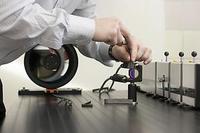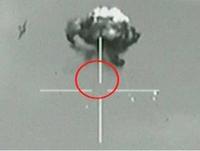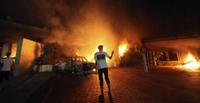-
U.S. to help Libya create an elite anti-terror force

The Obama administration has received a tacit Congressional approval to reallocate about $8 million from Pentagon operations and counterterrorism aid budgeted for Pakistan to Libya, for the purpose of building an elite Libyan force over the next year – a force that could ultimately rise to about 500 troops; the post-Qaddafi Libyan government does not have meaningful military and law enforcement forces at its command. Instead, it relies on several armed militias to maintain law and order in different parts of the country
-
-
Different technologies aim to replace dogs as explosives detectors
Bomb-sniffing dogs are the best and most popular way for airport security quickly to detect anyone planning to bring explosives to an airport; scientists are trying to change that; Dr. Denis Spitzer and his colleagues, for example, are working on a sensor that will detect vapors of TNT and other explosives in very faint amounts; the device they are trying to create would replace dogs as the top bomb detecting method in the field
-
-
Clinton says she was responsible for consulate security
Secretary of State Hillary Clinton said Monday night that she bore the ultimate responsibility for the security of U.S. diplomatic facilities around the world, and as such was responsible for any security failures that were exposed by the 11 September 2012 attack on the U.S. consulate in Benghazi; Clinton said, however, that the administration’s evolving story about what exactly happened at the consulate was attributable to “the confusion you get in any type of combat situation”
-
-
France intensifies campaign against domestic terrorism
In the wake of police raids in several cities in France, French prosecutors said that an Islamist terror cell was planning the biggest bomb attack on France since the mid-1990s; French police arrested twelve people in raids over the weekend; in one of the raids, a gun-wielding suspect was shot and killed; a French prosecutor said the explosive ingredients found garage in the Paris suburb of Torcy on Tuesday night could have made “exactly the same kind of device as was used in 1995 by the GIA” (the Algerian Islamist group exploded a bomb in the Paris Metro which killed eight people and injured 100); Francois Hollande has said that there will be “total mobilization of the state to fight all terrorist threats”
-
-
Terrorism in Indonesia is on the rise, with different targets

The terrorist attacks at two Bali nightclubs in 2002 killed 202 people and wounded another 240; in the ten years since, Indonesia has gained international praise for its counterterrorism efforts; data reveal, however, that more than 700 militants have been arrested over the past ten years, including eighty-four last year; dozens more have been killed since the Bali bombings; rather than attack Western tourists, Islamic militants now attack the Indonesian government and its agencies
-
-
Turkey intercepts a Syrian plane carrying arms from Russia
Tensions between Turkey and Syria continue to escalate, and yesterday Turkish planes forced a Syrian Airbus A320 passenger plane en route from Moscow to Damascus to land in Ankara after Turkish intelligence found that the plane was carrying armament and military equipment Russia was sending the besieged Assad regime; Turkey appears set to create a security zone inside Syria, which will be covered by a no-fly umbrella enforced by the Turkish air force; the no-fly measure would then be extended to the entire Syrian air space, preventing the Assad regime from using its air force to target the opposition, and preventing Iran from air-lifting military supplies to aid the regime
-
-
Rancorous congressional hearings on Benghazi attack marked by partisan rift
The House Committee on Oversight and Government Reform yesterday held hearings on the events surrounding the 11 September attack on the U.S. consulate in Benghazi, and the subsequent handling by the State Department of information released to the public; the hearings were marked by rancor and bitter political acrimony, with Democrats on the committee charging the Republican majority with political grandstanding
-
-
New Jersey “Texting against Terror” program a success
A $5.8 million federally funded program allowing New Jersey Transit commuters to “text against terror” has received 307 tips to the agency since the program started in June 2011; of those 307 messages, seventy-one have “referred to something regarding homeland security,” said Christopher Trucillo, chief of N.J. Transit Police
-
-
Green laser pointer identifies traces of dangerous chemicals in real time

By using an ordinary green laser pointer, the kind commonly found in offices and college lecture halls, an Israeli research team has developed a new and portable Raman spectrometer which can detect minute traces of hazardous chemicals in real time; the new sensor’s compact design makes it a candidate for rapid field deployment to disaster zones and areas with security concerns
-
-
State Department denies concluding attack on consulate was in reaction to anti-Islamic video
Ahead of hearings today before a congressional panel investigating potential security lapses at the U.S. consulate in Benghazi, the U.S. Department of State has said that it had no actionable intelligence about plans by a terrorist organizations for the deadly attack on the consulate; State Department officials also said the department had never concluded that the sacking of the mission was motivated by the U.S.-made video ridiculing Muslims
-
-
Hezbollah drone shot down over Israel

The Israel Air Force (IAF) planes shot down a UAV over the north Negev; the UAV entered Israeli air space from the west, but Israeli intelligence says the drone was launched by Hezbollah in Lebanon, then made its way south over the Mediterranean, then turned east when it reached the water off the Gaza Strip
-
-
Jewish Community Homeland Security Primer distributed to law enforcement agencies
Amidst the Jewish High Holidays, the Secure Community Network (SCN), the national homeland security initiative of the Jewish Federations of North America and the Conference of Presidents, distributed what SCN described as “a first ever” homeland security briefing primer for American law enforcement and homeland security agencies and national security partners across the United States
-
-
FBI investigators visit Benghazi consulate compound

After a delay of more than a week owing to security concerns, a team of several FBI investigators earlier this week visited the burned-down U.S. diplomatic compound in Benghazi to gather more information on the attack which killed Ambassador Stevens; the Department of State has created a 5-member independent investigative panel, the Accountability Review Board, to look into security arrangements at the compound, and to determine whether those arrangements were sufficient, and whether information about the deteriorating security situation in the city was ignored
-
-
Senate panel’s report harshly criticizes role, utility of DHS fusion centers
A 2-year bipartisan investigation by the U. S. Senate Permanent Subcommittee on Investigations has found that DHS efforts to engage state and local intelligence “fusion centers” has not yielded significant useful information to support federal counterterrorism intelligence efforts; the report says that senior DHS officials were aware of the problems hampering effective counterterrorism work with the fusion centers, but did not always inform Congress of the issues, nor ensure the problems were fixed in a timely manner; DHS estimates that it has spent somewhere between $289 million and $1.4 billion in public funds to support state and local fusion centers since 2003 (the report says that these are broad estimates which differ by over $1 billion); the Senate investigation raises questions about the value this amount of funding and the contribution the fusion centers make to the U.S. counterterrorism efforts; not everyone agrees with the report; Rep. Peter King (R-NY), chairman of the House Committee on Homeland Security, said: “I agree with Chairman Joe Lieberman and Ranking Member Susan Collins [of the Senate Committee on Homeland Security] that the subcommittee report issued this week paints with too broad a brush an incomplete picture that fails to recognize many of the important contributions that fusion centers have made in securing our Homeland”
-
-
Oregon terrorism suspect’s request to learn identity of government informant rejected

Mohamed Mohamud, a 21-year old Somali born Oregon resident, is accused of attempting to bomb Portland, Oregon’s 2010 holiday tree-lighting ceremony; a request by Mohamud and his defense team to learn the true identity of a government informant known only as “Bill Smith” was denied by U.S. District Judge Garr King
-
More headlines
The long view
What Does Netflix’s Drama “Adolescence” Tell Us About Incels and the Manosphere?
While Netflix’s psychological crime drama ‘Adolescence’ is a work of fiction, its themes offer insight into the very real and troubling rise of the incel and manosphere culture online.
